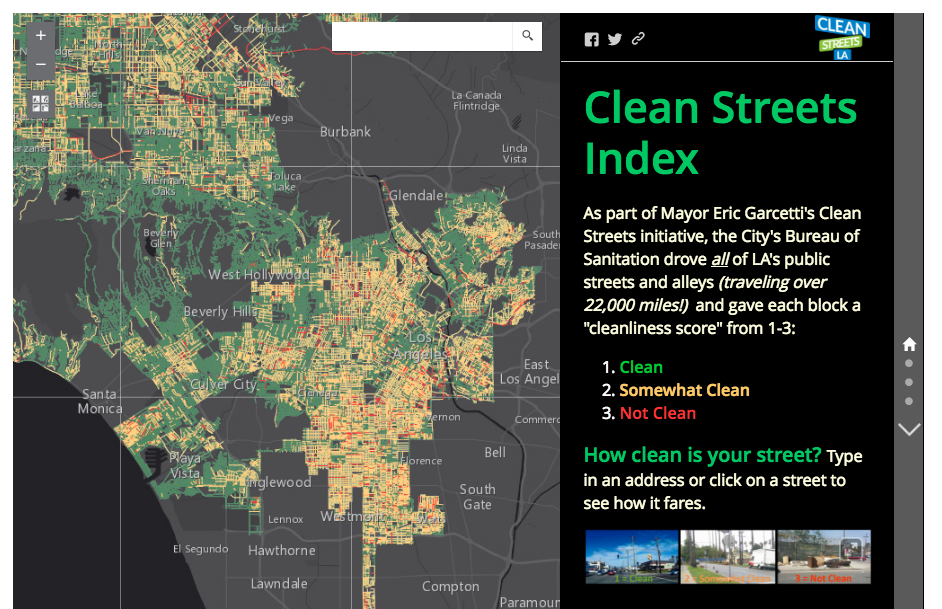Connecting state and local government leaders
Helping citizens build smarter communities through GIS technology the can help spur innovation, form connections and ultimately lead to action.
SAN DIEGO — As thousands of government and industry professionals gather in San Diego this week to discuss the latest in GIS technology at the Esri National Security Summit and User’s Conference, there are a few pointers about providing context for open data that are important to keep top of mind.
Over the past few years, we've seen more and more governments embrace the open data movement. Until recently, that has simply meant making authoritative government data available online for public consumption. The goal was to increase transparency and engage citizens; and that was a good first step.
Now a new phase in this movement is under way. Governments like the city of Los Angeles are working to give that data more meaning through context, so that the data can spur innovation, form connections, and ultimately lead to action.
Mapping applications driven by geographic information system (GIS) technology have proven to be particularly effective in providing context to data that would otherwise be seen in a spreadsheet. Vast amounts of information become easier to interpret when viewed in a map. It turns out that when it comes to analyzing big data, location can be just as significant a factor as it is in real estate. Location is the universal attribute. Because everything is located somewhere and in relation to something, smart maps based on GIS data have emerged as the grand unifier across governance and business.
After all, data without context is just noise. Here are four ways to deliver more meaningful open data that strengthens return on investment and provides greater value to people inside and outside of government.
1.) Open Data Internally and Externally
Citizens, such as entrepreneurs, researchers, and journalists, certainly need government data to do their work, but government employees benefit from it too. The key is providing one resource where people can find the data they need. Through the City of Los Angeles GeoHub, the city invites its employees to use the web GIS platform to find open data, access the city's GIS tools, and collaborate with peers. When government staff know where they can go to access data and contribute their information, it breaks down internal silos and sets up an environment conducive to exchanging ideas. This enables a surge in data-driven decision-making that supports safe, livable, and smart community programs.

2.) Launch Apps for Immediate Use
After data is made available, make it easy to use. Launching apps that consume open data immediately shows people the value of the data. Los Angeles, for example, has four apps on its main page: Street Wize, a map of construction and permit activities that are under way and coming soon including timelines; Clean Streets Index, which shows the cleanliness of streets in the city, from clean to somewhat clean and not clean; Road to 2400, which shows roadwork completed over time, starting in 2013; and Vision Zero, which details the city's data-driven road safety policy.
In addition to demonstrating what's possible with open data, apps invite people to engage with government. The Vision Zero app leads people to closely explore road safety datasets. The Clean Streets Index app asks citizens to get involved by reporting illegal dumping and volunteering for cleanups and shares ideas for putting the data to use, such as preventing illegal dumping and effectively deploying trash bins.
3.) Provide Context through Story Maps
Story maps are applications that combine interactive maps with multimedia—photos, videos, audio, and text—to tell place-based stories. This format gives governments a way to walk people through the data in one, clean, intuitive app. Los Angeles’ Clean Streets Index, Road to 2400, and Vision Zero apps are all story maps.
The Philadelphia Police Department's Outlook toward 21st Century Policing story map promotes the city's open data site, OpenDataPhilly.org, describing it as a way to ensure public access to critical public safety information. It also shows a map of violent crime by census tract, explaining that police efforts are focused accordingly; the map helps the police prioritize their work.
Other maps in the story map address important issues such as racial breakdown of car and pedestrian stops as well as shooting incidents across the city. In the text of this app, citizens are encouraged to evaluate data in its proper context and visit the Philadelphia Police Department's Accountability page.
Efforts like those of Los Angeles and Philadelphia communicate what is going on in a city much more than datasets alone can do. This approach supports transparency and accountability while also strengthening communication.
4.) Offer Training and Developer Resources
One of the biggest changes in the evolution of open data is educating the public. Taking the time to create short online videos gives the general public valuable information on how they can use open data. Tutorials can also generate ideas for application development, which in turn, increases a government's return on open data investments. Los Angeles supports application development with a prominent link to developer resources.
The open data portal for the City of Johns Creek, Georgia, not only highlights the categories of data it offers, including base data, demographic data, and public safety data, but it also shows the data that's trending and how-to videos. The three videos that are currently on the site show people how they can use open data to locate potential customers, find vacant commercial sites, and discover restaurants along a commute.
This emerging, holistic approach to delivering open data brings more people into the open data fold. Open data is no longer just for people who have deep technical expertise. Anyone can find government data, watch a tutorial on how to make use of it, peruse some apps for inspiration, and start using the data he or she is interested in. This workflow drives a culture of innovation and allows more people to contribute to building smart communities: citizen engagement at its best.
Christopher Thomas is Director of Government Markets for Esri.

NEXT STORY: Columbus ‘Put Forward an Impressive, Holistic Vision’ for Its Winning Smart City Plan



